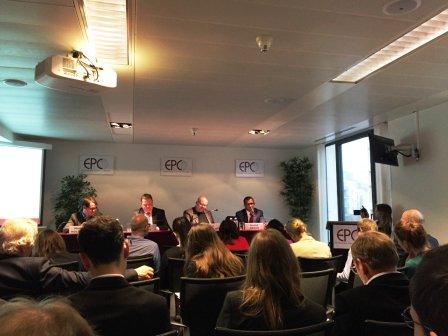The European Policy Centre held a Post-Summit Briefing about the Summit on 17-18 February and its outcome that could determine the future direction of the EU for years to come. The aim of the Summit was to reach agreement on the terms of a new settlement for the UK’s continued membership of the EU, which Prime Minister David Cameron could put to the electorate ahead of the planned “in-out” referendum. European Council President Donald Tusk set out the EU’s proposals in the four areas requested by Mr Cameron: economic governance, competitiveness, sovereignty, and social benefits/free movement and finally a deal reached. UK- EU deal clinched at last EU Council was a big success for President Tusk, his first big success in office.
At this Post-Summit Briefing, speakers analyzed the outcome and the implications of the deal for the UK referendum, as well as for the EU as a whole. They explored the alternatives and if this agreement could satisfy the UK without compromising the fundamental tenets on which the EU is built.
Mr Fabian Zuleeg (Chief Executive, European Policy Centre) started his intervention by evaluating the political theater’s UK question plot whose outcome was above the process and by emphasizing that nothing much unexpected happened. After some drama, the EU Summit produced the expected result: an agreement on the UK-EU relationship that broadly reflects the demands Prime Minister Cameron set out in his letter to President Tusk in November 2015. As widely expected, David Cameron has now set the date for the in-out referendum for the 23rd of June of this year. Mr Zuleeg underlined the political establishment behind the deal and referred to the reactions in the UK as predictable. The opponents of EU membership claim that the deal does not restore sovereignty of the UK and does not do enough to reduce migration numbers. The Conservative Party is split, with a significant part campaigning for a Brexit, including six Cabinet members and Boris Johnson, the Mayor of London. Even though Labour voters will be crucial to this UKinEU referendum. As a matter of fact, there are going to be big regional differences, with Scotland likely to vote decisively to stay in, raising the spectrum of a new independence referendum if the overall vote backs Brexit.
With this deal, the rest of the EU did what it could to encourage a positive outcome of the referendum. Unless the deal unravels in some way, which is unlikely in this short time frame, the focus of the debate will now be exclusively on the UK itself. EU cannot influence more, it has finished the process. By way of contrast, we would face unintended consequences if the EU institutions get involved more in the process. Furthermore, he mentioned the legal aspects of this deal concerning the free movement of people and the restriction of migrants, issues difficult for PM to deal with. On the question of what is the alternative to EU membership, he clearly stated that Swiss and Norway models are not alternative. They would not suit the UK’s system.
Paradoxically, the UK referendum is ostensibly about EU reform but in reality the current process makes any real discussion of reform impossible before the referendum is over and done with. He expressed his hope that after 23 June the UK is still inside the EU and that the discussions of EU reform start at that point – but the latter is much less likely than the former. What this process has not delivered is a fundamental reform of how the EU works. This was always unlikely. The process was unilateral, focused only on the UK, and the way of negotiating – based on the threat of withdrawal – is not a process which could or should be replicated for the twenty-eight. So a Yes is much more desirable but with the risk that a positive outcome of the referendum will also stop the discussions on reforming the EU. According to Mr Zuleeg there is a lack of appetite to engage with real reforms. There has been no debate around it.
Professor Anand Menon (King’s College) gave his statements on the deal issue and said that Cameron broke some of his manifesto pledges and that the imminent deal was about politics. For the Professor, the Conservatives take a hit to UKIP because of the European issue, although UKIP is going bankrupt for the moment. In this regard, he elaborated on the act of designation of ‘’in’’ and ‘’out’’ campaigns and raised the question of who from the stay or leave campaigns will the UK’s electoral commission designate? Will the UK have a one-side public funded campaign? Mr Matthew Holehouse (Political Correspondent, The Telegraph) pointed out that the deal clinched was a political deal, a question of momentum which will establish a multi-speed Europe of two, three and four speeds, and added that the fear factor will be decisive criterion during the conduct of the referendum. By the same token with Professor Menon, Mr Holehouse further touched upon the referendum/Brexit topic and underlined that it will be embedded in the British politics and continue to figure after the referendum of the 23rd of June.
With this deal, the rest of the EU did what it could to encourage a positive outcome of the referendum. Biggest tragedy about Brexit debate is that we have not started real debate about reforming the EU, concluded Mr Zuleeg and added, “The UK and EU were able to find an agreement, but will it be enough to prevent Brexit?” According to the panel, even if Brexit prevails, David Cameron will remain UK’s Prime Minister. The moderator of the post-summit briefing, Mr Janis A. Emmanouilidis (Director of Studies, European Policy Centre), in a sense of humour encouraged British PM to ask Greek Prime Minister, Alexis Tsipras, how to win a referendum.

